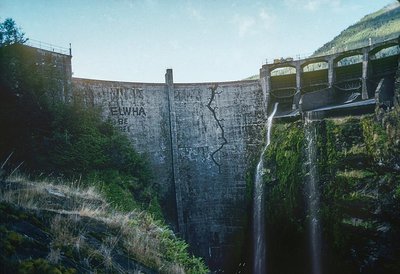
The Elwha Dam, illegally built without fish passage in 1913, blocked native salmon and steelhead from spawning in 70 miles of pristine habitat along Washington’s Elwha River. In 1987, Mikal Jakubal drew attention to the dam, tucked away in Olympic National Park, when he anonymously painted a large crack on it and the words “Elwha be free.” In 2013, the dam came down. The documentary film DamNation chronicles the success of dam removals, including the Elwha, Condit and Marmot dams, and calls for more action on high-cost, low-value dams such as those on the lower Snake River. DamNation screens 7 pm Thursday, June 19, at Bijou Art Cinemas.
Jakubal, who appears in the film and is himself a documentary filmmaker, also painted a crack on the Hetch Hetchy Reservoir dam in Yosemite National Park in 1987. Dean Coffey, general manager with the Hetch Hetchy Water and Power District told media at the time, “It was really a work of art — it wasn’t just graffiti.”
Ironically, Jakubal tells EW that despite the national attention his dam-cracks drew to the issue of dam removal, he himself didn’t become involved in the issue until recently — after he watched DamNation. He is now working to remove “salmon-killing” dams on the Eel River near his home in Northern California. He says the dams are “really old” and divert water from fish and the native ecosystem to “fuel subdivision sprawl and vineyards in Sonoma County.”
Dams are also a hotbed issue here in Oregon, where Western Environmental Law Center (WELC) attorney Pete Frost says Cougar Dam in the Willamette National Forest still needs work. A temperature control unit has been installed, and fish are currently trapped and hauled around the dam to reach their spawning grounds, but Frost says that of the young wild salmon that try to negotiate the dam’s turbines on their way out to sea, “not a lot survive.”
Dam removal feels very different from other types of environmental activism and advocacy he has been involved with, Jakubal says. “You take out a dam — getting out of the way and allowing these fish to return to ancestral spawning grounds, allowing the evolutionary clock to restart for them and for a watershed that’s been emaciated for 100 years, 150 years, however long it’s kept these fish from coming back.”
Taking out a dam means humans stop controlling that watershed, he says, and you know the dam won’t come back any time soon.
The DamNation screening, hosted by the WELC and Save Our Wild Salmon, will feature a panel discussion and audience Q&A session with Frost. Organizers say “the film is sponsored by Oregon-based Mountain Rose Herbs, the first business in Eugene to be Salmon-Safe Certified.” Tickets are $10.